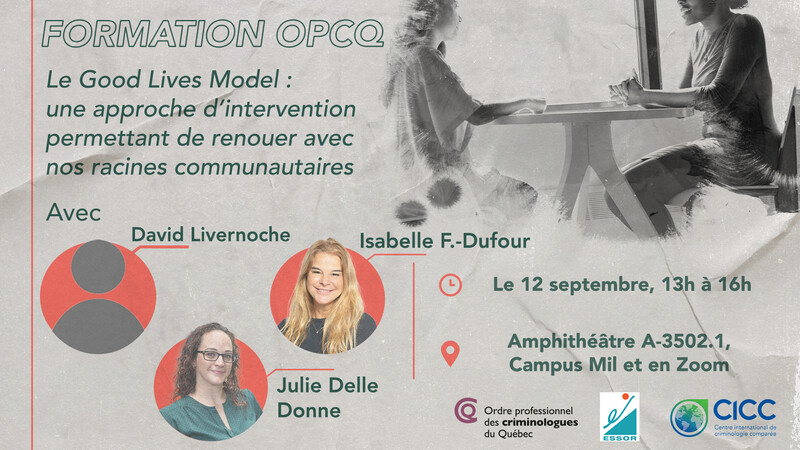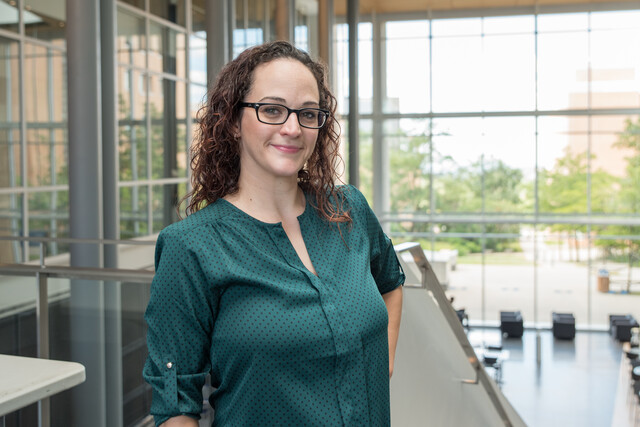
This field/research training course is co-organized by the Centre International de Criminologie Comparée, the Ordre Professionnel des Criminologues du Québec and CRC Maison Essor (Via-Travail Inc. corporation). The three speakers will present the GLM approach and its integration into the practices of CRC Maison Essor.
This free activity will be recognized by the OPCQ as continuing education for its criminologist members.
An OPCQ training session entitled ‘The Good Lives Model: an intervention approach to reconnect with our community roots’ presented by Julie Delle Donne, David Livernoche and Isabelle F.-Dufour.
Thursday, September 12, from 1:00 to 4:00 p.m., in amphitheatre A-3502.1 on the MIL campus of the Université de Montréal.


When CSC withdrew direct supervision from halfway houses, CRC Essor took the opportunity to define its intervention approach more clearly. Anxious to reclaim a role distinct from that of correctional services while remaining complementary to them, our resource adopted the Good Lives Model (GLM) as its intervention paradigm. Our presentation will begin with a more theoretical account of the foundations of the GLM and, in particular, what distinguishes this approach from the Risk-Need-Responsivity model. Secondly, we will show how this approach has changed our intervention practices and influences our conception of the clinical follow-up of people in conflict with the law. Based on a humanist perspective, the GLM enables us to support residents by building on their strengths and supporting their withdrawal from crime.
1- What is the GLM?
This first section will be led by professor-researcher Isabelle F.-Dufour, who will outline the theoretical foundations of the GLM approach and the main principles guiding its practice. She will explain how the GLM approach differs from and can complement the RBR model approach. The concepts of crime desistance and assisted desistance will also be discussed.
2- Integrating GLM into practice
The second section will be led by Julie Delle Donne, Director of CRC Essor, and David Livernoche, CRC Essor Clinical Advisor. They will explain how the intervention principles that guide the GLM have been integrated into the organisation's practice. They will discuss the benefits of this approach and the challenges encountered in implementing it. They will show in concrete terms how the approach has changed practices and illustrate the positive spin-offs observed to date using concrete examples.
In short, the aim of the presentation is to provide the audience with an introduction to the GLM approach, but also to raise awareness of how the GLM has enabled CRC Essor to move closer to its humanist aims.

Julie Delle Donne
Runs the CRC Maison Essor. She has worked in the field of social (re)integration for the Via-Travail corporation for over 10 years. A member of the Quebec Bar, she also holds a master's degree in criminology. She sits on the boards of the Association des services de réhabilitation sociale du Québec and Co-Gite intégration.

Isabelle F.-Dufour
Full professor of psycho-education at Université Laval. Her research focuses in particular on analysing the processes that lead to desistance from crime in adult and adolescent populations. She is a researcher affiliated with the Centre international de criminologie comparée (CICC) and the Institut universitaire Jeunes en difficultés (IUJD).

David Livernoche
Clinical counsellor at CRC Maison Essor since June 2022. He holds a master's degree in criminology (clinical intervention) from the École de criminologie de l'Université de Montréal, where his work focused on assisted withdrawal in correctional interventions.


When: Thursday, September 12, 2024, from 4 p.m. to 7 p.m.
Where: Université de Montréal, Complexe des sciences - campus MIL, 1375 avenue Thérèse-Lavoie-Roux, Atrium.
Who: Organized by the Via-Travail corporation (CRC Maison Essor and OPEX'82)
What: Networking event to promote social (re)integration
The fundraising activity organised by the Via-Travail corporation, which brings together the CRC Maison Essor halfway house and the OPEX'82 specialised employability services for people in conflict with the law, is designed to highlight the importance of working together to support the social (re)integration of people in conflict with the law. Our invitation is open to professionals in the field of social rehabilitation, academics, volunteers, employers looking for motivated workers and members of the community.
The funds raised will be used to strengthen the ties between Via-Travail and the academic community and to continue developing the intervention programme.
WHY PARTICIPATE?
VIP tickets :
-To support the cause of social (re)integration.
-To take part in a key event in the criminology community.
-To reserve promotional space for your organisation and the services you offer.
-To meet the community and publicise your mission.
-To meet students and recruit.
-To support the development of the Via-Travail programme.
Regular tickets :
-To discover the field of social (re)integration and its various partners.
-To find out about and support the development of the Via-Travail programme.
-To find out about upcoming events as part of National Social Rehabilitation Week.
Attention - Votre version d'Internet Explorer est vieille de 20 ans et peut ne pas vous offrir une expérience optimale sur le site du CICC. Veuillez mettre à jour votre ordinateur pour une expérience optimale. Nous vous recommandons Firefox ou Chrome, ou encore ChromeFrame si vous êtes dans un environnement corporatif ou académique dans lequel vous ne pouvez pas mettre à jour Internet Explorer.